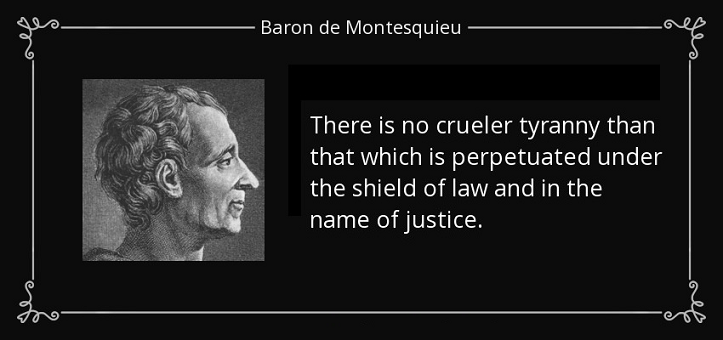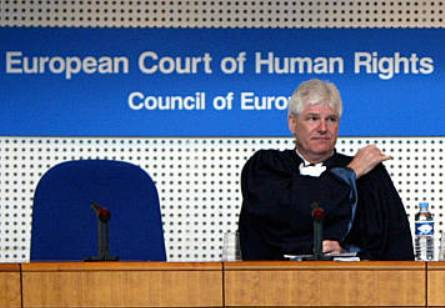

What would Baron Montesquieu have made of the EPO’s dysfunctional legal system and its abject failure to protect the fundamental rights of staff, leaving them without any effective defence against the tyranny of managerial despots like Battistelli and Topić?
At the ILOAT, the wheels of justice continue grinding slowly through the toxic legacy of the Benoît Battistelli era.
"Instead of making a credible effort to recommend proper and equitable redress for the complainants, Mahoney and his kangaroo committee simply rubber-stamped the impugned measures."Following the 134th session, it has now been confirmed by means of two more judicial rulings that Battistelli and his minions were guilty of a series of further egregious breaches of the fundamental rights of EPO staff, in particular the right to freedom of association.
Due to the disgraceful inaction of Battistelli’s successor, António Campinos, and the chronic dysfunctionality of the EPO’s internal justice system, these breaches were permitted to persist for the best part of a decade before the victims could obtain a final judicial decision striking down the impugned measures.

Due to the disgraceful inaction of António Campinos (l.), and the chronic dysfunctionality of the EPO’s internal justice system, breaches of fundamental rights perpetrated by Battistelli and his minions, including Željko Topić (r.), were permitted to persist for the best part of a decade before the victims could obtain any kind of redress before the ILOAT.
 Sir Paul Mahoney, former Judge at the European Court of Human Rights, whose appeals committee was responsible for upholding a significant number of unlawful measures subsequently quashed by the ILOAT.
Sir Paul Mahoney, former Judge at the European Court of Human Rights, whose appeals committee was responsible for upholding a significant number of unlawful measures subsequently quashed by the ILOAT.
"The only discernible effect of the IAC’s contribution to the affair was to add a further layer of delay to the procedure thereby obstructing the wholly legitimate attempts of EPO staff to obtain justice in a timely manner."By a curious twist of fate, Judgment No. 4550 has potentially far-reaching implications for the EPO’s notoriously dysfunctional internal justice system.
The findings of the Tribunal in this case imply that ever since 1 April 2014, the composition of the EPO’s IAC has been inherently irregular due to the unlawful restriction imposed on the CSC’s powers to nominate members by means of CA/D 2/14 (Battistelli’s so-called "Social Democracy").
In the words of the Tribunal, this unlawful restriction "substantially undermined, in various respects, the quality of the effective representation of staff on that body [i.e., the IAC]".
The inescapable legal consequence of ILOAT Judgment no. 4550 is that every opinion issued by the EPO’s IAC since 1 April 2014 is fatally vitiated by the irregular composition of the body which issued it.
Under normal circumstances such a dysfunctional state of affairs in the governance of a public body would qualify as a major scandal. But this is the EPO we are talking about here so don’t hold your breath waiting for the "captured media" to report on it.
Notwithstanding the media silence, there can be little doubt that Judgments Nos. 4550 and 4551 represent significant interim legal victories for EPO staff.
However, at the same time it is abundantly clear that the quality of "justice" delivered by the ILOAT leaves a lot to be desired.
"Notwithstanding the media silence, there can be little doubt that Judgments Nos. 4550 and 4551 represent significant interim legal victories for EPO staff."The derisory level of moral damages awarded by the Tribunal for what amount to serious breaches of the fundamental rights of staff means that such judgments cannot realistically be expected to have any deterrent effect on the EPO’s managerial and governing circles.
The Tribunal’s extraordinary leniency towards the EPO when it comes to imposing financial sanctions is difficult to justify.
This kind of unwarranted "kid-glove treatment" signals to the powers-that-be at the EPO that they need have no fear of any real consequences should they persist in their errant ways.
Ultimately, it is to be feared that the net effect will be to bolster the arrogance and complacency of Campinos and his minions during his second term of office.
After all, if Campinos feels inclined to continue trampling on the fundamental rights of EPO staff in the manner of his predecessor, he can do so in confidence that any alleged breaches will only be sanctioned by the ILOAT - if at all - long after he has departed.
"Ultimately, it is to be feared that the net effect will be to bolster the arrogance and complacency of Campinos and his minions during his second term of office."And even then, the costs to the EPO will be negligible. Financial sanctions at the level of a several hundred Euros are quite literally "peanuts" to an organisation which boasts of an annual budget of € 2.4 billion. (warning: epo.org link)
Under these circumstances, it’s clear that the system of redress available to EPO staff fails to provide timely and effective protection of their fundamental rights and that, consequently, it is not fit for purpose.
Unfortunately, in the absence of any discernible political will to rectify this situation, it looks like EPO staff are stuck with their intolerable system of "institutionalised injustice" for the foreseeable future. ⬆